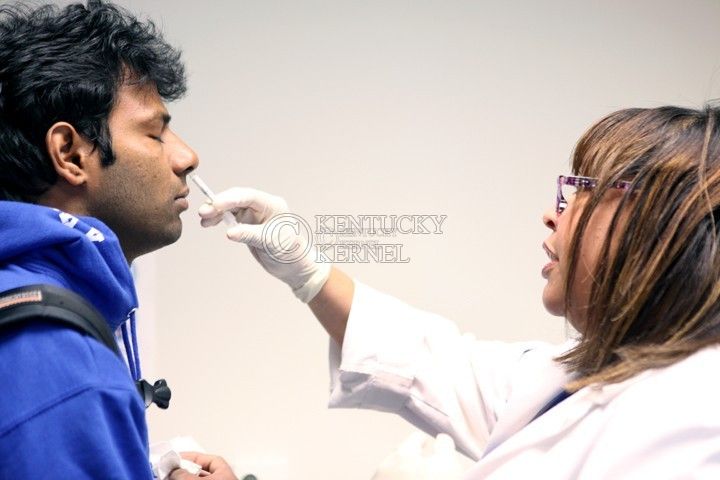First H1N1 clinic held for UK community a success
November 13, 2009
They stood in a growing line stretching out the door and down the block. Young and old, staff and student. They were not waiting for basketball tickets, for Black Friday shopping deals or for their turn at the polls.
Thursday morning, the University Health Services clinic began giving out vaccinations for the 2009 H1N1 influenza virus. UHS received an allotment of 2,000 doses of the vaccine on Monday, UK spokeswoman Amanda Nelson said.
At 9 a.m., a line of UK students and employees began signing in and receiving their vaccinations — intranasal doses for the healthy and injections for patients classified with risk factors. By 10 a.m., the clinic gave out 255 doses of the vaccine, UK spokeswoman Julie Meador said.
As of 3 p.m. on Thursday, the UHS had issued 1,212 vaccinations, UK spokeswoman Amy Ratliff said.
“I have young children. They’re little, they’re exposed to it and I’m working in an environment where I can be exposed,†said Carl Harper, a nursery inspector in the College of Agriculture.
Despite the long lines, patients were directed in and out of treatment rooms in an orderly fashion.
“This is the largest lot of vaccine that we’ve gotten as a university,†said Dr. Chris Nelson, UK Healthcare Enterprise medical director for infection prevention and control. “This is the first vaccine we’ve gotten for UK students. Before today, the vaccine has been given to mostly health care workers.â€
The front of Thursday’s line appeared to be mostly staff. As the morning went on, a larger number of students entered the line to receive their vaccination.
“I’ve had a lot of students in my classes out (with the flu),†said Katie Singleton, a Spanish and French education junior. “I figure with small classes and close contact, it would be best to protect myself.â€
The wait for a vaccine was only around 45 minutes, said Wesley McSparin, a biology junior who entered the line at 9 a.m. McSparin was among several students who said they missed class in order to wait in line and get a vaccination.
“I got the (intramuscular) injection because I have cystic fibrosis,†McSparin said.
Patients with the H1N1 flu usually have symptoms no more severe than normal seasonal flu strains, said Kristin Nordlund, spokeswoman for the Centers for Disease Control. Individuals with risk factors such as diabetes, asthma or other cardio-pulmonary illnesses are more likely to develop severe symptoms, Nordlund said.
Dr. Nelson said if enough vaccine keeps coming, more clinics will be held for the UK community.
“If we get another mass shipment of vaccine, we hope to do another mass vaccination,†Dr. Nelson said.


























































































































































